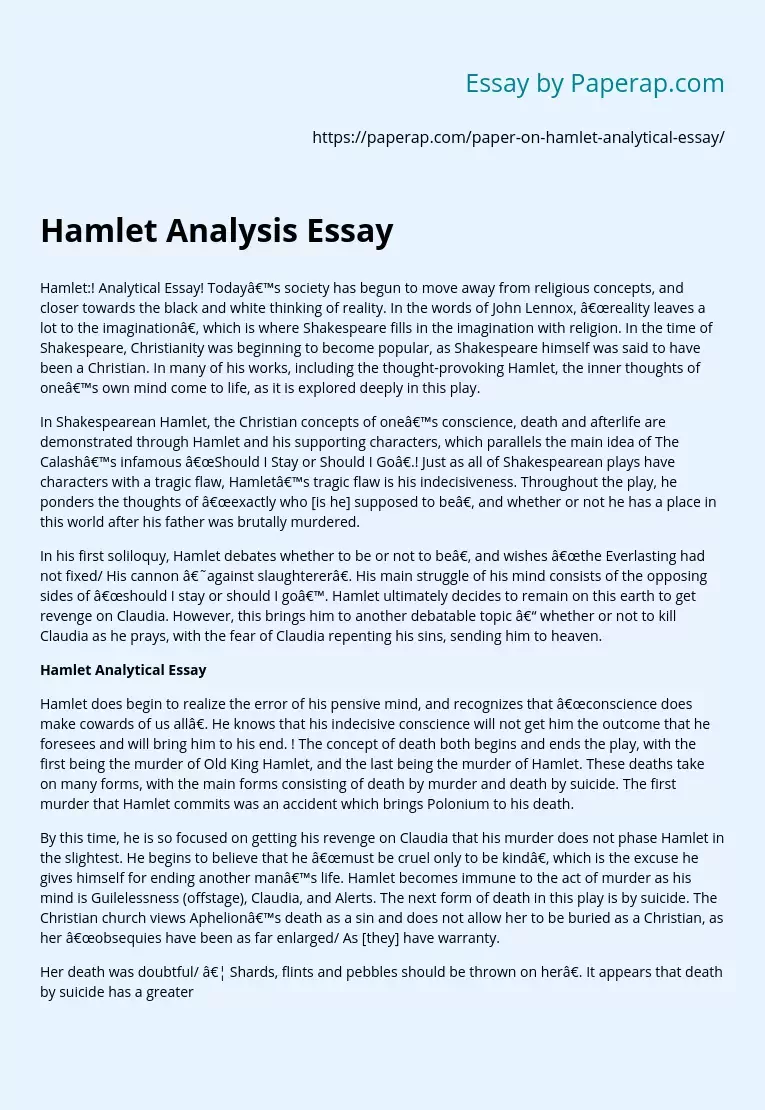Hamlet Analysis Essay
The following sample essay on Hamlet Analysis Essay tells about Old King Hamlet.
Today’s society has begun to move away from religious concepts, and closer towards the black and white thinking of reality. In the words of John Lennox, “reality leaves a lot to the imagination”, which is where Shakespeare fills in the imagination with religion. In the time of Shakespeare, Christianity was beginning to become popular, as Shakespeare himself was said to have been a Christian. In many of his works, including the thought-provoking Hamlet, the inner thoughts of one’s own mind come to life, as it is explored deeply in this play.
In Shakespearean Hamlet, the Christian concepts of one’s conscience, death and afterlife are demonstrated through Hamlet and his supporting characters, which parallels the main idea of The Calash’s infamous “Should I Stay or Should I Go”.! Just as all of Shakespearean plays have characters with a tragic flaw, Hamlet’s tragic flaw is his indecisiveness.
Throughout the play, he ponders the thoughts of “exactly who [is he] supposed to be”, and whether or not he has a place in this world after his father was brutally murdered.
In his first soliloquy, Hamlet debates whether to be or not to be”, and wishes “the Everlasting had not fixed/ His cannon ‘against slaughterer”. His main struggle of his mind consists of the opposing sides of “should I stay or should I go’. Hamlet ultimately decides to remain on this earth to get revenge on Claudia.
However, this brings him to another debatable topic – whether or not to kill Claudia as he prays, with the fear of Claudia repenting his sins, sending him to heaven.
Hamlet does begin to realize the error of his pensive mind, and recognizes that “conscience does make cowards of us all”. He knows that his indecisive conscience will not get him the outcome that he foresees and will bring him to his end. ! The concept of death both begins and ends the play, with the first being the murder of Old King Hamlet, and the last being the murder of Hamlet. These deaths take on many forms, with the main forms consisting of death by murder and death by suicide. The first murder that Hamlet commits was an accident which brings Polonium to his death.
By this time, he is so focused on getting his revenge on Claudia that his murder does not phase Hamlet in the slightest. He begins to believe that he “must be cruel only to be kind”, which is the excuse he gives himself for ending another man’s life. Hamlet becomes immune to the act of murder as his mind is Guilelessness (offstage), Claudia, and Alerts. The next form of death in this play is by suicide. The Christian church views Aphelion’s death as a sin and does not allow her to be buried as a Christian, as her “obsequies have been as far enlarged/ As [they] have warranty.
Her death was doubtful/ … Shards, flints and pebbles should be thrown on her”. It appears that death by suicide has a greater penalty with the church than murder, as no religious penalty was ever mentioned for murder. The concept of death in this play can be explained as “one day is fine and the next is black”. Death can be right around the corner, and one can be oblivious to it until it is too late. ! The living experience death as an ending, while the deceased experience the afterlife. The fate of one’s afterlife is determined by the actions made on earth.
Old King Hamlet left this world to go to purgatory as a result of the lack of repentance for his sins. The only way for him to proceed in his afterlife is to right his sins on earth through a surrogate. Next is the apparent afterlife of Claudia. Hamlet decides against killing Claudia as he prays, as he wishes Claudia’ “heels may kick at heaven/ And that his soul may be as damned and black/ As hell, whereto it goes”. Hamlet clearly wishes that Claudia will go to hell, as his mind believes that he has committed too many sins to be forgiven.
However, Hamlet has committed many sins of his own, and as he realizes this, he sees “the dread of something after death”, and contemplates his own afterlife. The lyrics “If I go there will be trouble” describe the predicament Hamlet will have in his own afterlife, which will probably be one of everlasting turmoil. The lyric which follows is , “… And if I stay it will be double”, which provides an explanation of all the murders and suicides that were a result of Hamlet’s decision to not end his life. !! The conscience drives one’s decision making, which determines the end, and the ate of the afterlife.
Hamlet has demonstrated how overthrowing can lead to unlawful deaths, and how one will pay for their sins in the afterlife. However, Hamlet and his family are Christians, and if they followed their own beliefs, the outcomes would have been different. Hamlet would have a clear conscience, no deaths would have taken place, and their afterlives would have been saved. Through this play, Shakespeare teaches the important lesson of morality. Do right, and one will be saved. Do wrong, and one will be punished.
Hamlet Analysis Essay. (2019, Dec 05). Retrieved from https://paperap.com/paper-on-hamlet-analytical-essay/

